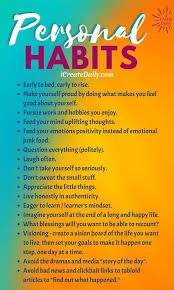The Power of Habits: How They Shape Our Lives
Habits are an integral part of our daily lives, shaping our behaviors, actions, and ultimately, our destinies. Whether we realize it or not, our habits have a profound impact on how we live and the outcomes we achieve. From simple routines like brushing our teeth in the morning to more complex patterns like procrastination or exercise, habits play a significant role in shaping who we are.
One key aspect of habits is their automatic nature. Once a behavior becomes habitual, we perform it almost unconsciously, without much thought or effort. This can be both a blessing and a curse. Positive habits such as regular exercise or healthy eating can lead to improved health and well-being over time. On the other hand, negative habits like smoking or excessive screen time can have detrimental effects on our physical and mental health.
Changing habits can be challenging but not impossible. By understanding the cue-routine-reward loop that drives habit formation, we can begin to rewire our brains and establish new, healthier behaviors. It takes time, consistency, and patience to break old habits and form new ones, but the rewards are well worth the effort.
One effective strategy for changing habits is to start small. Instead of trying to overhaul your entire routine overnight, focus on making incremental changes that align with your goals. For example, if you want to exercise more regularly, start by committing to a short workout session each day and gradually increase the intensity and duration over time.
Another important factor in habit formation is environment. Surrounding yourself with cues that prompt desired behaviors can make it easier to stick to new habits. For instance, if you want to read more books, keep them within easy reach or set aside dedicated time each day for reading.
In conclusion, habits are powerful forces that shape our lives in profound ways. By understanding how habits work and implementing strategies for change, we can take control of our behaviors and create positive outcomes for ourselves. Remember that change takes time and effort, but with determination and perseverance, you can break free from old patterns and cultivate new habits that lead to a happier, healthier life.
5 Key Benefits of Cultivating Positive Habits for Personal Success and Well-being
- Habits provide structure and routine in our daily lives, helping us stay organized and efficient.
- Positive habits can lead to improved health and well-being, both physically and mentally.
- Establishing good habits can increase productivity and help us achieve our goals more effectively.
- Habits can serve as automatic triggers for desired behaviors, making it easier to maintain consistency over time.
- Developing healthy habits can contribute to long-term success and personal growth by fostering positive change.
Six Drawbacks of Persistent Habits: Challenges to Health, Growth, and Relationships
- Habits can be difficult to break, especially if they are deeply ingrained.
- Negative habits can have detrimental effects on our health and well-being.
- Habits can lead to a sense of complacency, preventing us from seeking new experiences or growth.
- Unhealthy habits can create barriers to achieving our goals and fulfilling our potential.
- Habits can be limiting, keeping us stuck in routines that may not serve us in the long run.
- Bad habits can strain relationships with others and contribute to conflicts or misunderstandings.
Habits provide structure and routine in our daily lives, helping us stay organized and efficient.
Habits play a crucial role in providing structure and routine in our daily lives, contributing to our overall organization and efficiency. By establishing regular habits, such as waking up at a consistent time, following a specific morning routine, or prioritizing tasks in a certain order, we create a framework that guides our actions and decisions throughout the day. This structure helps us stay on track, manage our time effectively, and accomplish tasks more efficiently, ultimately leading to increased productivity and a sense of control over our daily responsibilities.
Positive habits can lead to improved health and well-being, both physically and mentally.
Positive habits play a crucial role in enhancing our overall health and well-being, encompassing both physical and mental aspects. By consistently engaging in healthy behaviors such as regular exercise, balanced nutrition, quality sleep, and mindfulness practices, we can strengthen our bodies, boost our immune systems, and improve our mental clarity and emotional resilience. These positive habits not only contribute to a healthier physical state but also promote a sense of inner peace, happiness, and overall vitality. Embracing such habits empowers us to lead fulfilling lives and navigate life’s challenges with greater strength and positivity.
Establishing good habits can increase productivity and help us achieve our goals more effectively.
Establishing good habits can significantly boost productivity and enhance our ability to achieve our goals efficiently. When we cultivate positive routines and behaviors, we create a structured framework that streamlines our daily activities and minimizes distractions. By consistently practicing productive habits, such as time management, prioritization, and focus, we optimize our workflow and make progress towards our objectives with greater ease. These habits not only improve efficiency but also instill discipline, motivation, and a sense of accomplishment, empowering us to reach new heights of success in both personal and professional endeavors.
Habits can serve as automatic triggers for desired behaviors, making it easier to maintain consistency over time.
Habits can serve as automatic triggers for desired behaviors, making it easier to maintain consistency over time. When a behavior becomes a habit, it no longer requires conscious effort or decision-making to execute. This automaticity allows individuals to effortlessly engage in positive behaviors, such as regular exercise or healthy eating, without relying solely on willpower. By establishing habits that align with our goals and values, we create a framework that supports long-term consistency and success in achieving our desired outcomes.
Developing healthy habits can contribute to long-term success and personal growth by fostering positive change.
Developing healthy habits can contribute significantly to long-term success and personal growth by fostering positive change. When we cultivate habits that prioritize our physical, mental, and emotional well-being, we set ourselves up for sustained progress and fulfillment. Consistent exercise, balanced nutrition, regular self-reflection, and effective time management are just a few examples of healthy habits that can lead to improved productivity, resilience, and overall life satisfaction. By consciously choosing to adopt behaviors that align with our goals and values, we create a solid foundation for continuous growth and achievement in various aspects of our lives.
Habits can be difficult to break, especially if they are deeply ingrained.
Habits can be difficult to break, especially if they are deeply ingrained. When a behavior becomes so automatic and ingrained in our daily routines, it can feel like second nature to engage in it, making it challenging to change or eliminate. These deeply rooted habits often have strong emotional or psychological ties, further complicating the process of breaking free from them. Overcoming such entrenched habits requires a conscious effort, self-awareness, and a willingness to confront the underlying factors that reinforce these behaviors. It may take time and persistence to unravel these patterns and replace them with healthier alternatives.
Negative habits can have detrimental effects on our health and well-being.
Negative habits can have detrimental effects on our health and well-being, leading to a decline in physical, mental, and emotional wellness. Habits such as smoking, excessive consumption of alcohol, poor dietary choices, and lack of exercise can contribute to various health issues such as heart disease, obesity, diabetes, and mental health disorders. These habits not only impact our physical health but also affect our overall quality of life, reducing our energy levels, increasing stress levels, and hindering our ability to function optimally in daily activities. It is crucial to recognize the harmful consequences of negative habits and take proactive steps to break free from them in order to safeguard our well-being.
Habits can lead to a sense of complacency, preventing us from seeking new experiences or growth.
Habits can lead to a sense of complacency, preventing us from seeking new experiences or growth. When we become too comfortable with our routines and familiar patterns of behavior, we may resist stepping out of our comfort zones to explore new opportunities or challenges. This complacency can hinder personal development and limit our potential for growth and self-improvement. By breaking free from the constraints of habitual thinking and behavior, we open ourselves up to a world of possibilities and endless opportunities for learning, innovation, and personal evolution.
Unhealthy habits can create barriers to achieving our goals and fulfilling our potential.
Unhealthy habits can create significant barriers to achieving our goals and fulfilling our potential. When we engage in behaviors that are detrimental to our well-being, such as poor eating habits, lack of exercise, or excessive procrastination, we hinder our ability to reach our full potential. These habits can drain our energy, diminish our focus, and impede our progress towards personal and professional growth. Breaking free from unhealthy habits requires conscious effort and dedication to replace them with positive behaviors that support our goals and aspirations. By recognizing the negative impact of these habits and taking proactive steps to change them, we can remove obstacles standing in the way of realizing our true potential.
Habits can be limiting, keeping us stuck in routines that may not serve us in the long run.
Habits can be limiting, keeping us stuck in routines that may not serve us in the long run. When we become too comfortable with familiar patterns of behavior, we may resist change and miss out on opportunities for growth and personal development. These limiting habits can create a sense of stagnation and prevent us from exploring new possibilities or reaching our full potential. It’s important to recognize when our habits are holding us back and be willing to break free from them in order to embrace positive change and progress in our lives.
Bad habits can strain relationships with others and contribute to conflicts or misunderstandings.
Bad habits can strain relationships with others and contribute to conflicts or misunderstandings. Whether it’s a habit of being consistently late, constantly interrupting others, or being overly critical, these behaviors can create tension and resentment in interpersonal interactions. Over time, these negative habits can erode trust, communication, and mutual respect within relationships, leading to arguments, hurt feelings, and even the breakdown of once-strong connections. It’s important to recognize the impact of our bad habits on those around us and make a conscious effort to address and change them for the betterment of our relationships.




